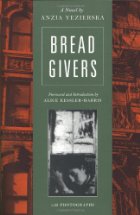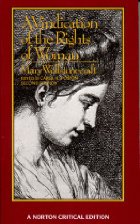
If you are American, and probably even if you are not, you have heard this story before: determined immigrant leaves the Old World behind to seek their fortune in the New; working their way out of a life of crushing poverty, they encounter the prejudices of those better-established than they are, and struggle to find a balance between honoring the traditions of their family while at the same time becoming acculturated to their new, adopted country. Anzia Yezierska's The Bread Givers presents this archetypal plot-line with little to no variation: the specifics of the Smolinsky family's Polish, Orthodox Jewish background and their life on Hester street in New York City's Lower East Side tenements, let alone the characterization of individual family members, often seem secondary to the overwhelming familiarity of the plot. I found this to be particularly true due to Yezierska's simplistic, episodic style of narration, which skips from event to event, sometimes encapsulating whole years in two or three pages, and allowing most characters to remain mere sketches rather than rounded individuals.
Given these initial reactions, though, there are a few things that distinguish The Bread Givers from other versions of the "immigrant experience novel." Surprisingly unusual, especially given its 1925 publication date, is the simple fact that Yezierska's narrator protagonist, Sara Smolinsky, is a woman. Reading of Sara's clashes with her Orthodox rabbi father, I was reminded of such modern immigration tales as Maxine Hong Kingston's The Woman Warrior and Edwidge Danticat's Breath, Eyes, Memory—in both of which, as in The Bread Givers, the female protagonist's primary point of conflict is with the traditions and assumptions of her family or culture of origin, rather than with the dominant American culture. Sara, for example, manages to win over her initially aloof professors and college classmates, but making peace with her own father is much more challenging. This is, of course, also true of many immigrant tales with male protagonists (Chaim Potok's The Chosen leaps to mind), but I wonder if it's a more common theme in those centering around women. Even in The Chosen, Danny has only to fight against his father's prescriptiveness, which stems from a cultural assumption that he is too precious, too valuable to make his own decisions. Sara Smolinsky, on the other hand, struggles against cultural assumptions that she is worth nothing, has no value of her own outside of serving men:
"God put people on earth to get married and have children yet. It says in the Torah, Breed and multiply. A woman's highest happiness is to be a man's wife, the mother of a man's children. You're not a person at all. What do you make from yourself? Why do you hold yourself better than the whole world?"
Indeed, this concept of "a person" is one of the more interesting linguistic specifics in The Bread Givers, and forms a thematic thread outlining Sara's attempts to clarify her own goals in life. She wants to be "a person" in her own eyes and the eyes of the world, and perceives her home of origin—a cramped tenement on Hester Street—to be below the "bottom starting point" on the road to this goal. In some contexts, "a person" seems to mean simple humanity, as in Reb Smolinksy's quote above. In this sense, Sara's comment about her family's living quarters is strictly true: they are living in de-humanizing conditions. But "a person" or "a person among people" can also mean more than this. When little Sara goes in search of herring to re-sell cheaply, she insists on paying for them: "I want to go into business like a person. I must buy what I got to sell." Likewise, upon leasing her first flat away from her family, she thinks of the closing door as "the bottom starting point of becoming a person." After her graduation from college, she muses "How grand it felt to lean back in my chair, a person among people, and order anything I wanted from the menu." Being a "person," then, relates to economic and lived independence—the ability to assert one's own selfhood. It also relates to self-respect; "a person among people" doesn't make money or secure lodgings any way she can, but does it in a manner that lets her respect herself. A real "person" is also respected by those around her, accepted and valued by others who also live up to the standard of person-hood. To Reb Smolinsky, this means allying his family with others further up the social ladder:
"The impudence of that long-haired beggar—wanting to push himself into my family! I'm a person among people. How would I look before the world if I introduced such a hunger-squeezed nobody for a son-in-law?"
For Sara, on the other hand, it means self-actualization, and finding a community that values the same things she does, that shares her estimation of her own value:
"Don't worry. I'll even get married some day. But to marry myself to a man that's a person, I must first make myself for a person.
Fully "being a person," I suppose, means at the most basic level that one matters, that one asserts one's own value, and that one has succeeded in finding a community that agrees with that assertion.
Another thought-provoking element of The Bread Givers was its depiction of Rabbi Smolinsky's self-justification for living off the labors of his wife and daughters. Despite my utter secularism, I must say that the value placed on textual study and reasoned, informed argument is something I find pretty inspirational about the tradition of Judaism. I may not restrict my own textual analysis to scripture (or even, I may as well admit, include scripture in the texts I study), but I do feel strongly the spiritual importance, in my own life, of keeping sacred some time to study, to think and reason, to engage with texts, to discuss and interpret. In order for that activity to remain sacred, however, I feel it must either be self-supported, or supported consensually by one's whole community (a congregational ministry model, in which the rabbi or minister is presumably giving something of value BACK to the community supporting him or her—and let me just acknowledge that in my limited experience of modern-day rabbis and ministers, many are radically underpaid for the value they offer their congregations). Reb Smolinsky's self-satisfied assumption that he deserves to live off the sweat of his wife and daughters, while only contributing to their spiritual well-being through berating them with self-serving aphorisms, is therefore undeniably horrifying to me, as it becomes to Sara herself.
And I wonder if the mixture of "traditional" American values with Smolinsky's Orthodox background, make for a particularly violent collision. After all, the United States is known for fetishizing individualism, particularly male individualism, and particularly male individualism that manifests itself in monetary earnings. Americans, collectively, are obsessed with the notion of the "self-made man." When Americans come into contact with a culture or an individual that values knowledge, education, or artistic expression over self-earned income, we are often at a loss. Reb Smolinsky's case is more complex than this: he obviously does value wealth, and uses it as a yardstick to measure the worth of his daughter's suitors and others, but one gets the sense that this kind of value exists, for him, on one level, whereas he himself exists on a more rarefied plane. Whether this is a genuine belief of his or a mere self-justification for his hypocrisy, it's severely problematic, especially since he is unwilling or unable to acknowledge that others may not share his own priorities. Sara, for example, has moments of admiration for her father's dedication to his Torah studies, but he is largely incapable of admiration for her own drive to educate herself, let alone of respecting her on her own terms.
So um, not sure how long I'm going to keep this up, but...
BREAD GIVERS
Hibbledy hobbledy
Sara Smolinsky, she
Worked her way up from the
Lower East Side;
Fighting her patriarch's
Ultra-misogynist
Hellfire and brimstone helped
Toughen her hide.
The Bread Givers was the Wolves selection for January; join us the last weekend of February for Rosalind Belben's Our Horses in Egypt!
And with the internet as my witness, y'all, that is my first and last New York City novel of 2011. As long as you don't count Paterson, New Jersey as NYC.









